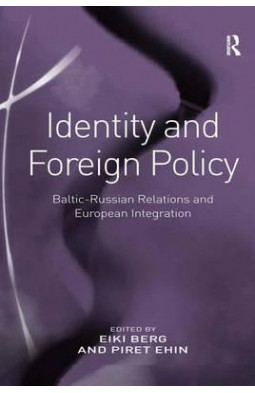Identity and Foreign Policy
Individual order




 0
0 reviews
0
0 reviews
99.00 uah
ISBN:
9780754673293
Availability:
Author
Eiki Berg , Piret Ehin
Format
Hardcover
Number of pages
216
Publisher
Wiley
Size
16.5 x 2.5 x 24.8
Year of publication
2009
Weight
0.45kg
- About the book
- Reviews (0)
About the book Identity and Foreign Policy
Ідентичність та зовнішня політика | Відносини країн Балтії з Російською Федерацією були складними і напруженими з часів розпаду СРСР та відновлення незалежності Естонією, Латвією та Литвою. Не зважаючи на те, що вступ цих країн до Європейського Союзу (ЄС) створив новий міжнародний контекст у відносинах між країнами регіону, приєднання не принесло очікуваного покращення у відносини країн Балтії з Росією. Цей об'ємний том досліджує зв'яки між ідентичністю та зовнішньою політикою на основі Російсько-Балтійських відносин та розширенні ЄС. У ньому проаналізовані та пояснені зміни у відносинах країн Балтії та РФ після приєднання обох до НАТО та ЄС. Особливу увагу приділено впливу ідентичності та детально показано, як і при яких умовах ідентичність прямо впливає на зовнішню політику. Засновуючись на конструктивістському підході міжнародних відносин, у цій книзі зрозуміло та яскраво описана динаміка розвитку Російсько-Балтійських відносин після приєднання до НАТО та ЄС. У ній не використовується спеціалізований жаргон, тому ця книга підійде для наукових співробітників та студентів, які займаються вивченням зовнішньої політики, відносин країн, що не входять до ЄС, та міжнародні відносини в загальному.Identity and Foreign Policy | Baltic-Russian relations have been complicated and tense since the collapse of the USSR and the restoration of Estonian, Latvian and Lithuanian independence. Although Baltic accession to the European Union (EU) has created a new international context for interstate relations in the region, enlargement did not bring about the much hoped for improvement in Baltic-Russian relations.This case study rich volume, examines the relationship between identity and foreign policy focusing on Baltic-Russian relations and the deepening and widening of the EU. It analyzes and explains developments in Baltic-Russian relations after both NATO and EU enlargement focusing in particular on the impact of identity and carefully demonstrates whether, how and under what circumstances identity shapes foreign policy behaviour.Built on a constructivist perspective in international relations, this volume provides a coherent and illuminating account of the dynamics of Baltic-Russian relations after NATO and EU enlargement. Avoiding specialist jargon and drawn-out theoretical discussions, it will meet the needs of academics and students of foreign policy, EU external relations and international relations more generally.
Other books by the author
Eiki Berg , Piret Ehin
Eiki Berg , Piret Ehin
Book reviews Identity and Foreign Policy (0 reviews)
+ Добавить отзывPreviously reviewed
One click buy


 +38 050 462 21 01
+38 050 462 21 01







